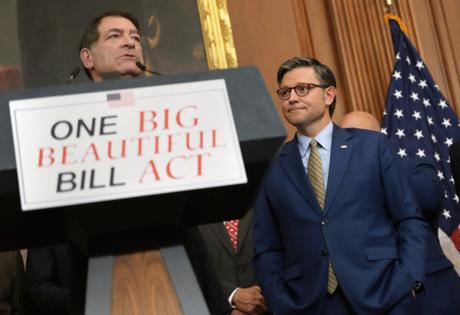Commentary: GOP tax bill will hurt children and families
Published in Op Eds
One component of the House Republicans’ newly passed tax bill is a small, temporary expansion to the child tax credit, meant to help nudge up the birth rate and enable more parents (mostly mothers) to opt out of paid work.
At the same time, the bill includes major cuts to child-serving programs including Medicaid and SNAP (formerly food stamps). This comes at the same time the Trump Administration is cutting or delaying funds for child care and Head Start.
The reality is that the extra child tax credit is far too small to replace the benefits from these essential programs. At the end of the day, families will have a harder time making ends meet and being able to spend more time with their kids.
It’s true that many families — especially those with children under age five — could use some more support. As one of four co-authors of “Cradle to Kindergarten,” a book about early childhood policy, I have long argued that parents should have real choice about their children’s care.
But the proposed support for families is small: The House-passed bill would provide a $1,000 “Trump Account” payment that is invested in the stock market for newborns and a child tax credit of $2,500 per child per year (up from the existing $2,000), but only through 2028. The full enhanced tax credit would amount to just 9% of the federal poverty level of $26,650 for a family of three.
Given the costs of raising a family in this day and age, an extra $500, or even $1,000, per child per year, combined with program cuts, will do little if anything to provide low-and middle-income families with real economic security or choice in their children’s care.
Meanwhile, the Trump administration is delaying or slashing funding for child care and Head Start that actually help working families and promote children’s development. Consider that in 2023, four in 10 working mothers, many of whom were single moms, were the breadwinners in their household. Compare that $2,500 credit to the cost of child care, which in 2022 had a median cost of between $6,552 and $15,600 for full-time care for one child.
The House-passed bill also creates new work requirements and paperwork hurdles for those who receive assistance through Medicaid and SNAP. Medicaid pays for more than four in 10 births and nearly half of all children participate in SNAP before they turn 20.
The bottom line: Republicans are trying to rip massive holes in the safety net programs children rely on, and plug them with a tiny tax credit.
If Republicans really want to help parents spend more time with their kids, minimum wage hikes, paid sick leave and paid family leave have proven to be effective policies. But, in 2023, one in five civilian workers did not have any paid sick leave, and only 27% had paid family leave through their employer. Taking unpaid leave is unaffordable for many, particularly those working at or near minimum wage.
Time with our children is rewarding. Nearly half of parents, and even a higher share of fathers, say they spend too little time with their children, mostly due to work. Research also shows the importance of parent-child time, especially in enriching activities like reading, for children’s development.
But we know there are stark income and education differences in the time parents and children spend together, which proposed policies could narrow.
Finally, if Republicans really wanted to increase employment, it would make much more sense to expand, not cut, public preschool and child care, as opposed to work requirements for Medicaid and SNAP, which result in people losing their coverage and benefits and do not increase employment.
What’s clear is that, together, the expanded child tax credit and social program cuts in the House reconciliation bill won’t move the needle in expanding opportunity or allowing parents to spend more time with their kids.
_____
Taryn Morrissey is professor, department chair, and associate dean of research at American University School of Public Affairs. This column was produced for Progressive Perspectives, a project of The Progressive magazine, and distributed by Tribune News Service.
_____
©2025 Tribune Content Agency, LLC.

























































Comments